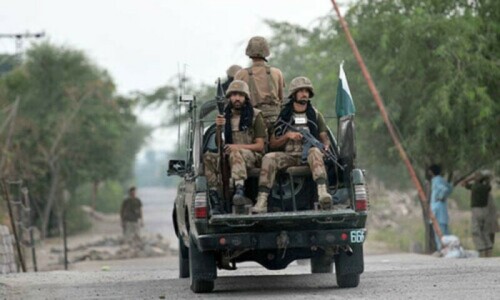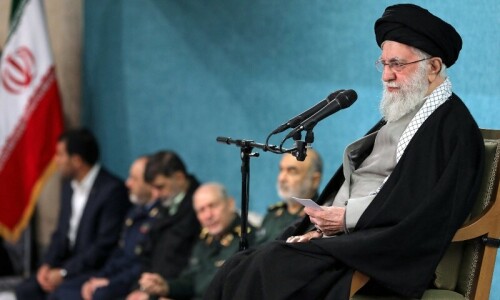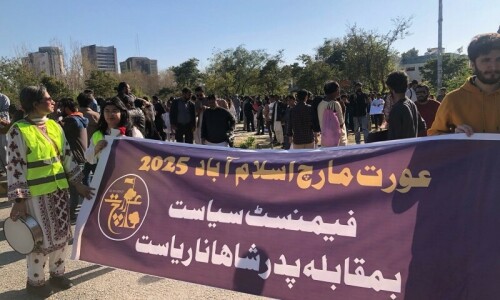
ISLAMABAD: Three stakeholders came together on Saturday to begin a joint drive to clean up Rawal Lake that will continue today (Sunday) and tomorrow (Monday).
The drive was launched by Islamabad Capital Territory (ICT) administration, Metropolitan Corporation Islamabad (MCI) and the Punjab Irrigation Department. They removed four truckloads of garbage from the on the first day.
In August last year, the ICT and MCI had collected debris and other garbage from the shore and shallow waters of the lake to protect aquatic life and clean the environment.
There are several authorities involved in Rawal Dam’s affairs. Safeguarding aquatic and wildlife around the dam is the responsibility of the ICT administration, the land around the lake comes under the administrative control of the Capital Development Authority and MCI and a major portion of the water is the property of Punjab.
Keeping the lake clean has been a challenge because the departments involve shift responsibility on to the others, and there is no structured coordination in this regard.
Cleanliness drive by ICT, MCI and Punjab Irrigation Department to continue until tomorrow
The dam is maintained and operated by the Punjab Irrigation Department, but the major beneficiary of Rawal Lake is Rawalpindi’s Water and Sanitation Agency (Wasa), which is supplied 23 million gallons of water daily from the reservoir.
Another beneficiary is the ICT Fisheries department, which has the power to award fishing contracts.
An official from the Punjab Irrigation Department said: “70pc of the Rawal Lake catchment area is in Murree, which is in Punjab, and around 30pc of the catchment is in Islamabad territory.”
Water is supplied to the National Agricultural Research Council (NARC) for its research farms according to the same ratio for agricultural purposes. The National Institute of Health and farmlands that mainly grow fodder for the Presidential Guards are situated close to the lake on Banigala Road.
An MCI official said that the municipal areas of Islamabad caused negligible pollution in the shape of solid waste or sewerage flowing into the lake, and it was therefore not their responsibility to clean the lake.
Sewerage and garbage flow into Rawal Lake from Murree tehsil and the Bhara Kahu area, and the Punjab Irrigation Department has complained that garbage should not flow in natural water courses.
The Bhara Kahu area falls in the jurisdiction of ICT, while the Rawalpindi Municipal Waste Company is responsible for collecting and disposing of garbage from Murree city. Meanwhile, the Pakistan Environmental Protection Agency is responsible for keeping a check on the quality of water in the lake.
Twin cities to work together on price control
The local administrations of the twin cities announced on Saturday that they would work together to frame a strategy to control the prices of essential food items and to work on the Clean and Green Pakistan initiative.
The decision was made during a joint meeting of the price control committee at the Rawalpindi deputy commissioner’s office held to discuss price controls and ways to remove the disparity in the prices of essential commodities between the twin cities.
Rawalpindi Deputy Commissioner Saifullah Dogar and Islamabad Deputy Commissioner Hamza Shafqaat chaired the meeting, which was attended by market committee, food department and union representatives.
Mr Shafqaat said that joint efforts were made to lift litter from the embankments of Rawal Lake, and such activities should be increased in the areas between the twin cities.
He said the prices of vegetables, fruit and other essential food items would be controlled at the I-11 fruit and vegetable market so traders would sell with minimal profits and people would be able to buy goods at reasonable prices.
Joint action was taken in and around Rawal Dam to remove illegal structures and solid waste, Mr Shafqaat added.
He said: “The Punjab Irrigation Department and its organisations, such as the Small Dams Organisation, need to be activated to control pollution in Rawal Lake. The Islamabad administration will provide support to all of them in this regard.”
Mr Dogar said the Rawalpindi administration would provide its support to joint efforts under the Clean and Green Pakistan programme.
He said the Rawalpindi and Islamabad administrations were working to keep prices of essential food items at the I-11 market low, and that they monitored the auction of fruits and vegetables so they are sold at reasonable prices.
Traders and other departments’ representatives were on board to keep prices stable in the market,
Published in Dawn, January 12th, 2020












































